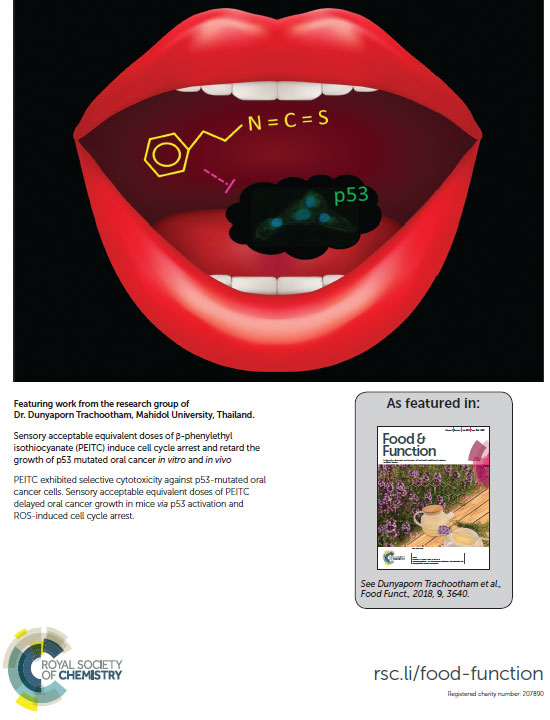Sensory acceptable equivalent doses of β -phenylethyl isothiocyanate (PEITC) induce cell cycle arrest and retard the growth of p53 mutated oral cancer in vitro and in vivo
Institute of Nutrition, Mahidol University



Sensory acceptable equivalent doses of β -phenylethyl isothiocyanate (PEITC) induce cell cycle arrest and retard the growth of p53 mutated oral cancer in vitro and in vivo
Institute of Nutrition, Mahidol University
Title :
Sensory acceptable equivalent doses of β -phenylethyl isothiocyanate (PEITC) induce cell cycle arrest and retard the growth of p53 mutated oral cancer in vitro and in vivo
Researchers :
Aroonwan Lam-ubol, Alison Lea Fitzgerald, Arnat Ritdej, Tawaree Phonyiam, Hui Zhang, Jeffrey N. Myers, Peng Huang and Dunyaporn Trachootham
Many bioactive food compounds such as β-phenylethyl isothiocyanate (PEITC), a phytochemical in cruciferous vegetables, showed anti-cancer effects at high dose. However, such high dose is not feasible for consumption due to a strong mouth-tingling effect. This study investigated the anti-cancer effect of PEITC at sensory acceptable doses. In vitro, PEITC was selectively toxic to several kinds of oral cancer cells compared to non-tumor oral cells. In vivo, PEITC at the doses equivalent to human sensory acceptable doses, retarded tumor growth and prolonged the survival of mice bearing p53-mutated oral cancer cells. Mechanistically, PEITC induced oxidative stress, activation of protein p53 and p21 and stopped division of cancer cells. These findings suggested that the sensory acceptable doses of PEITC selectively inhibit cancer cell growth through oxidative stress -mediated mechanism leading to delayed tumor progression and extended survival. PEITC could be a functional ingredient for oral cancer prevention.

Applied Research Project to Usage : The research findings from this work have been used for research and development of novel food products for oral cancer patients to maintain their health in stable condition and promote quality of life.
Publishing : Featured on the back cover of Food & Function, an international peer-review journal Food Funct., 2018, 9, 3640 – 3656.
Key Contact Person :
Asst.Prof.Dr.Dunyaporn Trachootham
Institute of Nutrition, Mahidol University
dunyaporn.tra@mahidol.ac.th, dunyaporn.tra@,mahidol.edu